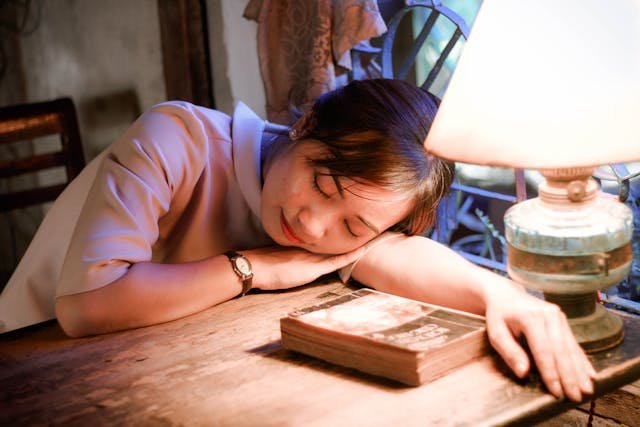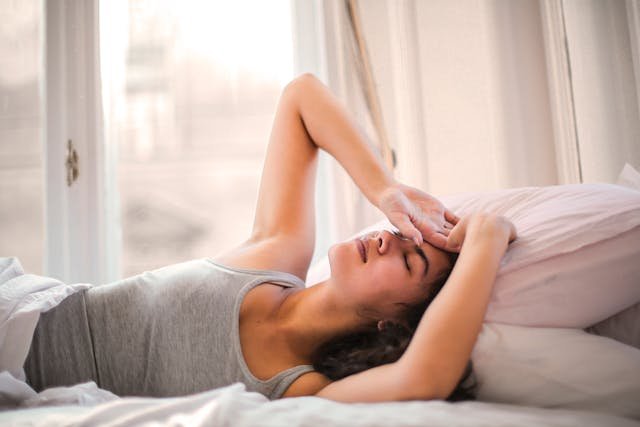Anxiety always seems to be worse at night. If you find it difficult to fall asleep with anxiety and racing thoughts, this is the perfect science-backed guide to help you sleep better.

It’s 11 p.m. in the night.
You are extremely tired from the day you’ve had. Your blue-light-emitting mobile phone was turned off almost an hour ago, and you’ve sprayed your lavender soothing mist in the room. Your blackout eye mask is right near your bedside and ready to be used. And you’re reading a page from ‘Maybe You Should Talk To Someone,’ from a real, tangible book, not a Kindle version.
In short, you have meticulously transformed your bedroom into a peaceful haven. You have ticked off all the right boxes to help you fall asleep.
Yet, the moment you turn off the light, a different switch flips on in your brain. Suddenly, your thoughts shift gears. You are being reminded about all the things under the face of the Earth that you need to worry about. It could be that imaginary sound down the hallway, the stray cat in the colony, or something that happened during the course of your day.
And before you know it, you’re forced down the rabbit hole of overthinking and intrusive thoughts. You spent the rest of the night overanalyzing the tiniest details of your life.
Forget sleep; you’re lucky if you can snooze for longer than an hour.
If this sounds familiar, you’re not alone. According to Sleep Health America, an astounding 50 million people in the country struggle to fall asleep.
Most of these problems are fuelled by debilitating anxiety during sleep. Having anxiety while trying to fall asleep can significantly affect your sleep quality. It can disrupt your sleep patterns and make it harder for you to fall and stay asleep. This is true for people with a diagnosed generalized anxiety disorder or for those under a lot of stress.
A survey by the American Psychological Association found that nearly 45% of citizens felt that they experienced anxiety during sleep. This led to sleep deprivation, which, in turn, made their anxiety worse.
If you’ve been struggling to fall asleep with anxiety, here’s a complete breakdown of the relationship between sleep and anxiety. We’ll also go through a list of science-backed tips that can help with sleep anxiety. Let’s dive in.
What Is The Relation Between Anxiety And Falling Asleep?

Most adults need seven to nine hours of sleep to rest and rejuvenate adequately. Sleep has close links with mental health and well-being, which is why the state of your mind is crucial in determining how easily you can fall and stay asleep.
So, when you experience anxiety when trying to fall asleep, your body gets on a high alert. This causes a part of your nervous system, called the sympathetic nervous system, to engage with your heart and increase your blood pressure. This puts your body in a fight-or-flight mode as if you’re geared to fight a lion in the forest.
However, more often than not, you’re just lying in the bed.
But why do you feel anxiety while sleeping? Here are the reasons:
1. Sleep deprivation and anxiety are vicious companions.
Anxiety and falling asleep are closely linked. When you’re high on cortisol (the stress hormone) and put in flight-or-fight mode, it’s hard to fall asleep.
Being unable to sleep due to anxiety leads to sleep deprivation. But, when you don’t get enough sleep, your amygdala (the part of your brain tasked with processing your emotions) gets fired up and increases your anxiety.
This sets in a vicious cycle that significantly affects your physical and mental health.
2. Pre-bedtime is the prime time for anxiety.
If you can’t sleep because of anxiety at night, it’s most commonly not your fault.
Anxiety is usually heightened around bedtime. While you can feel panic throughout the day, the exact weight of your anxiousness and intrusive thoughts becomes palpable as you climb into your bed at the end of the day. Some people don’t even notice their anxiety until the moment they find themselves staring at the ceiling in the middle of the night.
This is usually because when you’re about to sleep, there are fewer distractions vying for your attention. This is probably the only time you’re not working, talking, or socializing, and therefore, your mind starts drifting into rumination.
3. Anxiety when trying to sleep is fuelled by hustle culture.
If you’re a part of the all-encompassing hustle and always ‘on’ culture, it’s no surprise that you feel panic while falling asleep. People are conditioned to believe that resting is selfish and unfruitful. They’re expected to continue working toward higher levels of enlightenment without taking a break.
After all, why would you want to fall asleep when you can work to outperform yourself?
These delusional and downright unhealthy ideas fuel anxiety while sleeping. People feel guilty about resting and are worried about getting up and going on time in the morning.
So, How Do You Actually Fall Asleep With Anxiety?

Whether you’re struggling with anxiety during the day, right before falling asleep, or in the middle of your sleep, here are the best tips to help you find the sleep of your dreams.
1. Begin by changing your morning routine.
You might have heard that age-old adage that “summer bodies are built in winters.”
Similarly, the key to falling asleep with anxiety is found in your morning routine. In fact, the hardest time to fix your bedtime routine is actually your bedtime.
Therefore, modifying your morning routine is the best thing for sleep anxiety. Here’s what you can add to your morning routine to help with sleep anxiety:
- Waking up at the same time every day.
- Getting out of bed right after you wake up.
- Exercising in the morning instead of night.
- Eating a balanced breakfast.
This ensures that your body is actually set to feel tired by the end of the day. Therefore, you’ll be able to fall asleep with anxiety. This will also regulate your internal systems and help reset your circadian rhythm.
2. Schedule a “worry time” way before bed.
We know how counterproductive this sounds, but having a designated “worry time” before bed is one of the best sleep remedies for anxiety.
These 30-minute sessions should be scheduled in the evening after you’ve completed the major part of your day. However, do not schedule them near your bedtime, as residual worries can creep in and affect your sleep.
Having a worry time is one of the best tips to fall asleep with anxiety. Facing your worries head-on with a mindful thought process helps avoid panic while falling asleep. This also teaches you to stop overthinking and ruminating outside of your regular time, thereby increasing your resilience.
3. Don’t stay lying awake in bed for more than 20 minutes.
Another effective way to fall asleep with anxiety is to follow this 20-minute rule.
The condition is simple – if you’ve been lying awake in bed for 20 minutes, unable to sleep due to anxiety, it’s time to get up. Try to get out of bed and engage yourself in a soothing activity. Avoid unnecessary stressors like mobile phones or any other electronic devices. Instead, try doing something that helps you overcome your panic while falling asleep. Indulge in meditation, reading, or Yoga.
When you get out of bed, you stop associating it with the worry that occupies your head. This way, you’ll hopefully start feeling relaxed and sleepy as you get back to bed later. You can practice the same technique if you wake up in the middle of the night and struggle to fall back asleep.
4. Decide a sleeping time that suits you the best.
Even if you’re struggling to fall asleep with anxiety, going to bedtime can disrupt your sleep cycle regardless. This way, you might find yourself lying awake in the middle of the night, which could fuel your anxiety even more (remember the vicious cycle we talked about).
Therefore, go to bed when you feel sleepy. When you start feeling drowsy at night, your melatonin production is usually at its highest. If you try to fall asleep during this window, you’re more likely to stay asleep throughout the night.
5. Consult a doctor or therapist.
If you struggle to fall asleep with anxiety, it can significantly affect your health and well-being. Your entire life – from your daily mood to energy levels, relationships, and productivity – is adversely affected as a result of this.
Therefore, if you can’t fall asleep due to anxiety, you need to get to the bottom of this. And the best way to do this is by getting proper professional help.
While the best sleep remedies for anxiety can help to a certain level, you might need more than just lifestyle changes to recover from your condition. Therefore, speaking to your general practitioner or a mental health professional might be the best way to move forward.
Conclusion:
Fighting with anxiety during the day is extremely taxing and hard. Having to fight the same battles to fall asleep with anxiety can take a hefty toll on your mind and body. This is even more significant due to the vicious relationship between anxiety and falling asleep.
We hope these tips will help you fall asleep faster. If you need help with sleep anxiety, consulting a mental health professional is of utmost importance. Access to mental health therapists is now easier than ever with the advent of online therapy platforms. To learn more about the top online therapy platforms, click here.
To continue learning about mental health daily, subscribe to Your Mental Health Pal.

